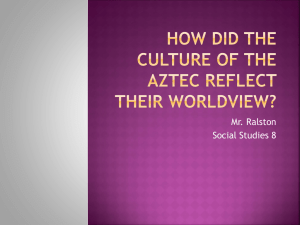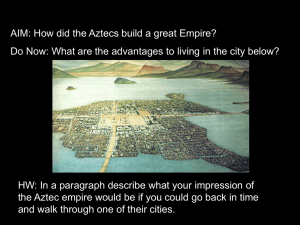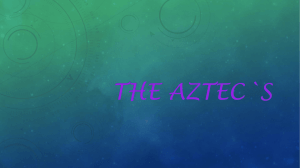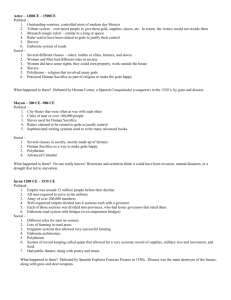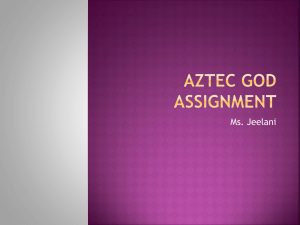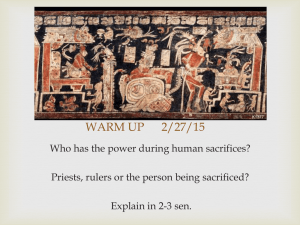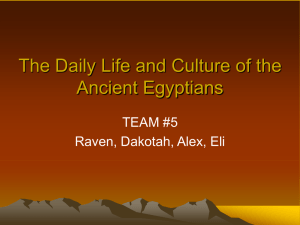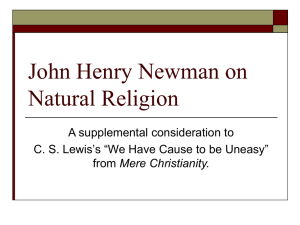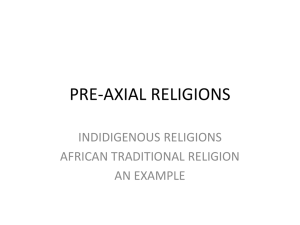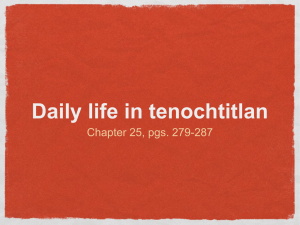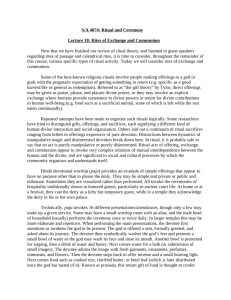Ancient Aztec Religion (http://www.aztec
advertisement
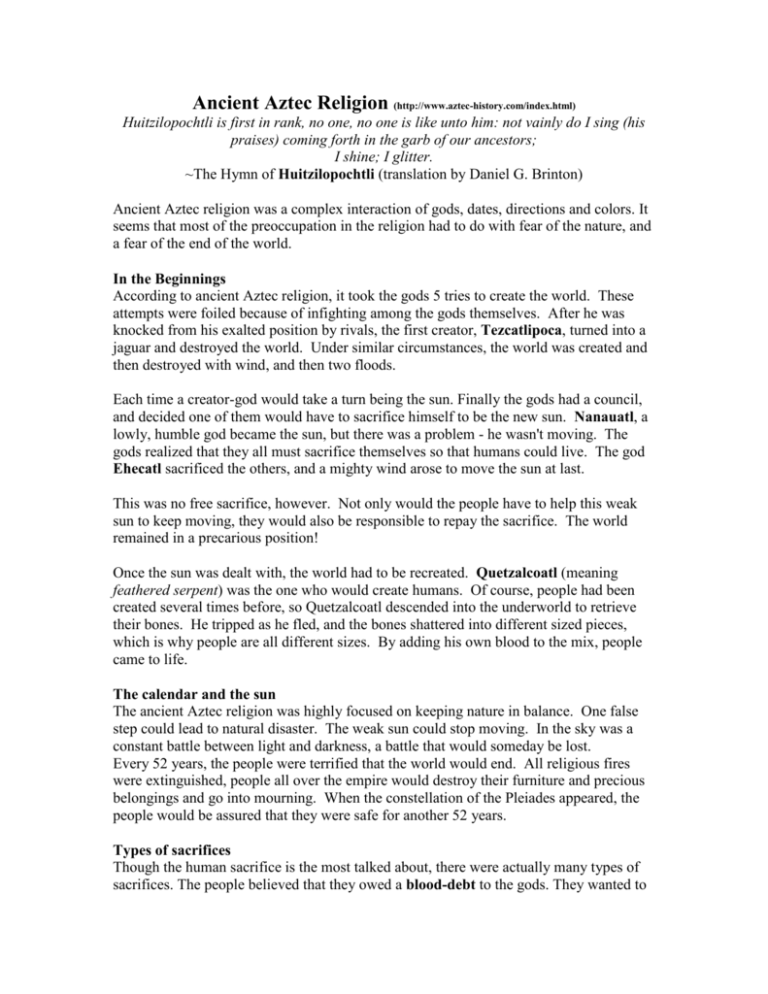
Ancient Aztec Religion (http://www.aztec-history.com/index.html) Huitzilopochtli is first in rank, no one, no one is like unto him: not vainly do I sing (his praises) coming forth in the garb of our ancestors; I shine; I glitter. ~The Hymn of Huitzilopochtli (translation by Daniel G. Brinton) Ancient Aztec religion was a complex interaction of gods, dates, directions and colors. It seems that most of the preoccupation in the religion had to do with fear of the nature, and a fear of the end of the world. In the Beginnings According to ancient Aztec religion, it took the gods 5 tries to create the world. These attempts were foiled because of infighting among the gods themselves. After he was knocked from his exalted position by rivals, the first creator, Tezcatlipoca, turned into a jaguar and destroyed the world. Under similar circumstances, the world was created and then destroyed with wind, and then two floods. Each time a creator-god would take a turn being the sun. Finally the gods had a council, and decided one of them would have to sacrifice himself to be the new sun. Nanauatl, a lowly, humble god became the sun, but there was a problem - he wasn't moving. The gods realized that they all must sacrifice themselves so that humans could live. The god Ehecatl sacrificed the others, and a mighty wind arose to move the sun at last. This was no free sacrifice, however. Not only would the people have to help this weak sun to keep moving, they would also be responsible to repay the sacrifice. The world remained in a precarious position! Once the sun was dealt with, the world had to be recreated. Quetzalcoatl (meaning feathered serpent) was the one who would create humans. Of course, people had been created several times before, so Quetzalcoatl descended into the underworld to retrieve their bones. He tripped as he fled, and the bones shattered into different sized pieces, which is why people are all different sizes. By adding his own blood to the mix, people came to life. The calendar and the sun The ancient Aztec religion was highly focused on keeping nature in balance. One false step could lead to natural disaster. The weak sun could stop moving. In the sky was a constant battle between light and darkness, a battle that would someday be lost. Every 52 years, the people were terrified that the world would end. All religious fires were extinguished, people all over the empire would destroy their furniture and precious belongings and go into mourning. When the constellation of the Pleiades appeared, the people would be assured that they were safe for another 52 years. Types of sacrifices Though the human sacrifice is the most talked about, there were actually many types of sacrifices. The people believed that they owed a blood-debt to the gods. They wanted to avert disaster by paying the endless debt. So blood was a common theme - the sacrifice that the gods required. So, animals would be sacrificed, as well as humans. Also, there was ritual blood-letting, where people would cut themselves to offer their blood to the gods. Human Sacrifice Human sacrifice was practiced to some extent by many peoples in Mesoamerica (and for that matter, around the world) for many centuries. But it was Aztec sacrifice that really took the ritual to new heights. How many people were sacrificed by the Aztecs? We don't know how many were sacrificed over the years - it's possible that some accounts are exaggerated - but it was probably thousands each year - tens of thousands or more all together. Some estimates claim 20,000 a year. The Aztecs had 18 months in one cycle, and for each of the 18 months there was ritual sacrifice. The victim would be painted as a part of the ritual, they would be placed on a slab where their heart would be removed and held up to the sun. The body would be thrown down the stairs of the temple/pyramid. The body would be disposed of in various ways, such as feeding animals at the zoo or putting on display (the heads). There are some accounts of cannibalism, but it's uncertain if this was practised to any great extent. There were other ways that humans would be sacrificed - shot with arrows, drowned, burned, or otherwise mutilated. Killing in a fight (like the Roman gladiators) also took place. Both the empire's own people, and their enemies were sacrificed. The warriors were often involved in a special ritual war called a xochiyaoyotl (or flower war/flowery war). The object was not to gain territory or kill the enemy, but to capture them as food for the gods. Both sides of the battle were required to fight, and they usually were willing participants. The people would be captured instead of killed, and then sacrificed. The end Prophecies were a part of the ancient Aztec religion. Many scholars today believe that the Aztec people thought that the conquerer Hernan Cortes was their god-hero Quetzalcoatl, who had been banished. Whether or not the more educated upper class shared this belief is questionable. The afterlife of a person was based mostly on how they died. Some, such as those sacrificed to Huitzilopochtli, would join the battle against the darkness. In ancient Aztec religion, some would eventually be reincarnated as birds or butterflies, or eventually humans. Some would be, for a time, disembodied spirits roaming the earth. Most at some point would have to make the long journey through the 9 levels of the underworld. People would be buried in a squatting position, with items that would help them in their journey. In the end they would live in darkness.
